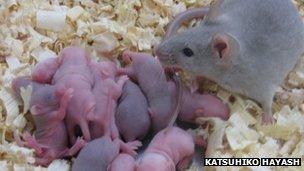Life created from eggs made from skin cells
- Published

The resulting mice were fully fertile
Stem cells made from skin have become "grandparents" after generations of life were created in experiments by scientists in Japan.
The cells were used to create eggs, which were fertilised to produce baby mice. These later had their own babies.
If the technique could be adapted for people, it could help infertile couples have children and even allow women to overcome the menopause.
But experts say many scientific and ethical hurdles must be overcome.
Healthy and fertile
Stem cells are able to become any other type of cell in the body from blood to bone, nerves to skin.
Last year the team at Kyoto University managed to make viable sperm from stem cells. Now they have performed a similar feat with eggs.
They used stem cells from two sources: those collected from an embryo and skin-like cells which were reprogrammed into becoming stem cells.
The first step, reported in the journal Science, external, was to turn the stem cells into early versions of eggs.
A "reconstituted ovary" was then built by surrounding the early eggs with other types of supporting cells which are normally found in an ovary. This was transplanted into female mice.
Surrounding the eggs in this environment helped them to mature.
IVF techniques were used to collect the eggs, fertilise them with sperm from a male mouse and implant the fertilised egg into a surrogate mother.
Dr Katsuhiko Hayashi, from Kyoto University, told the BBC: "They develop to be healthy and fertile offspring."
Those babies then had babies of their own, whose "grandmother" was a cell in a laboratory dish.
Devastating blow
The ultimate aim of the research is to help infertile couples have children. If the same methods could be used in people then cells in skin could be turned into an egg. Any resulting child would be genetically related to the mother.
However, Dr Hayashi said that was still a distant prospect: "I must say that it is impossible to adapt immediately this system to human stem cells, due to a number of not only scientific reasons, but also ethical reasons."
He said that the level of understanding of human egg development was still too limited. There would also be questions about the long-term consequences on the health of any resulting child.
Dr Evelyn Telfer, from the University of Edinburgh, said: "It's an absolutely brilliant paper - they made oocytes [eggs] from scratch and get live offspring. I just thought wow! The science is quite brilliant."
However, she warned that this had "no clinical relevance" as there were still too many gaps in understanding about how human eggs developed.
"If you can show it works in human cells it is like the Holy Grail of reproductive biology," she added.
Prof Robert Norman, from the University of Adelaide, said: "For many infertile couples, finding they have no sperm or eggs is a devastating blow.
"This paper offers light to those who want a child, who is genetically related to them, by using personalised stem cells to create eggs that can produce an offspring that appears to be healthy.
"It also offers the potential for women to have their own children well past menopause raising even more ethical issues.
"Application to humans is still a long way off, but for the first time the goal appears to be in sight."
Dr Allan Pacey, from the British Fertility Society and the University of Sheffield, said: "What is remarkable about this work is the fact that, although the process is still quite inefficient, the offspring appeared healthy and were themselves fertile as adults."
- Published26 February 2012
- Published4 August 2011